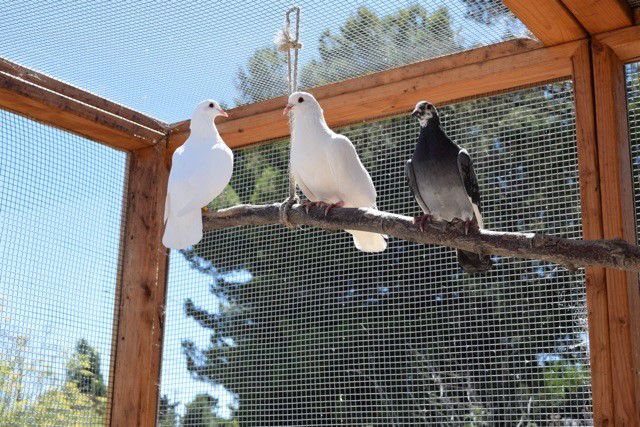SAN FRANCISCO – Every week, 10-year-old Molly Fox loads her four pet pigeons into a carrier and takes them for a walk around her San Francisco neighborhood. There’s Guru, the shy one; Ajax, sweet and addicted to safflower seeds; and Johnson, who’s aggressive. The fourth, Pax, used to be calm, according to Molly, but Johnson has brought out his combative side.
“He does wing-fu, which is when they slap their wings at you,” said Molly, whose allergies prevent her from having a more traditional pet. “But we’ve gotten used to it.”
Molly’s pigeons came from the Bay Area-based Palomacy, the country’s only dedicated pigeon adoption group. It’s a volunteer organization that for nine years has been finding homes for rescued pigeons – and trying to improve the reputation of birds often maligned as “rats with wings.”
San Francisco resident Elizabeth Young launched the group after noticing that the animal shelter where she volunteered took in a surprising number of pigeons. It tried to find homes for cats and dogs, Young recalled, but it didn’t even bother with the birds – they were simply euthanized.
Young said she fell in love with one gentle pigeon she named Gurumina and found a home for her. Then there was another, and more after that, and Palomacy was born. The organization, funded by donations and grants, has since rescued more than 700 birds, and it has become Young’s full-time job.
Palomacy is only one modern chapter in a human-pigeon relationship that goes back thousands of years. As Andrew D. Blechman explains in Pigeons: The Fascinating Saga of the World’s Most Revered and Reviled Bird, the rock pigeon is the world’s oldest domesticated bird. The birds made appearances in Egyptian hieroglyphics, and over time they’ve been valued for their feces (an excellent fertilizer) and their military service (32 pigeons received medals after World War II for delivering crucial messages).
It’s only in recent years that we’ve turned against them. Blechman theorizes that attitudes started changing when pigeons followed us into cities, gathering in large groups, their excrement staining buildings and sidewalks. But people still use pigeons – for racing, for meat and for mimicking their cousins in “dove releases.”
All those activities have created domestic breeds unable to survive in the wild. The pigeons you see crowding places like London’s Trafalgar Square thrive in their city environment, but when breeds like homing, King and English Carrier pigeons end up lost or abandoned, it can be a death sentence. That’s where Palomacy comes in.
The group makes the counterintuitive case that rescued pigeons make an ideal pet. Got allergies? Get a pigeon. Got a tight budget? Pigeons are vegan, so their diets are cheap. (Building an aviary: Not so much.)
They’re also clean, quiet and have an impressively relaxed approach to the world, Young said.
“I call pigeons masters of a leisure art. They like to nap, they like to lay in the sun, they like to bathe,” she explained. “They flirt, they snuggle. They’re total romantics.”
Studies have also found that they’re smart enough to categorize objects and (sort of) count. Pigeons have such great eyesight that they’ve been trained to successful identify cancer cells in mammograms and sailors and equipment lost at sea.
“They’re very intelligent. They can recognize themselves in mirrors,” said Molly, who lets her pigeons fly around the house while she practices violin. “Johnson’s the vainest pigeon. We always see him looking at himself in mirrors.”
But not surprisingly, pet pigeons remain a hard sell. Young said people don’t connect with a pigeon unless they hold one, so she takes the birds to events and decks them out in little diapers so they don’t poop everywhere. I recently visited Palomacy’s aviary, where 18 tweeting birds were flying about and admiring themselves in a full-length mirror. Yeti, a rescued King pigeon, gradually began to relax and coo as I held him and scratched the back of his neck. I thought about the arbitrary empathy we have for animals: Why do I baby-talk to a passing dog but resent the pigeons that share my city?
“I call these birds gateways to compassion. A lot of people say, ‘Pigeons, ew.’ But then they meet them and are blown away,” Young said. “A nurse I know calls her pet pigeons her beta blockers. They’re very therapeutic.”
Today, Palomacy is something of a victim of its own success. Its aviary is at capacity, and 20 foster homes also can’t take on more birds. People call every day from all over the country asking to drop off the injured pigeon their cat brought in.
“Pigeons are so humble, so accessible, so easily dismissed,” Young said. “If the next time you see pigeons, you notice them a little more, you’re a little more tolerant, have a little nicer feeling toward them, that’s better. That makes a better world. Not just for them, but for all of us.






